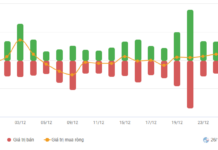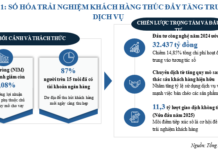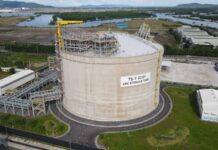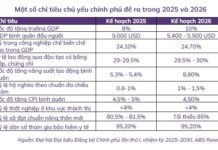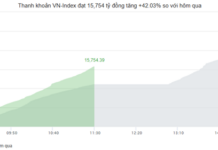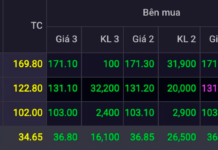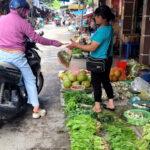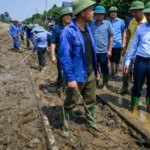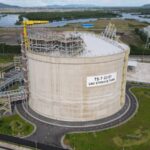On September 18, 2024, the Ministry of Agriculture and Rural Development organized a conference on “Supporting the recovery of crop production after storms and floods in the Northern provinces and cities.” Presiding over the conference, Deputy Minister of Agriculture and Rural Development, Hoang Trung, stated that Storm No. 3 (Yagi) had caused severe damage to agricultural production in the Northern provinces.
NEED FOR TENS OF THOUSANDS OF TONS OF RICE AND VEGETABLE SEEDS
Regarding rice alone, 200,000 hectares were flooded, with estimated losses of VND 3,000 billion. For flowers and fruit trees, the damage was estimated at VND 1,250 billion.

“It is very sad and heartbreaking. Many areas were flooded up to the banana trees. Many areas with valuable ornamental and fruit trees were also submerged. There were rice fields ready for harvest but couldn’t be harvested due to the floods, and the rice sprouted like beans,” shared Deputy Minister Hoang Trung.
According to the assessment of the Ministry of Planning and Investment, Storm No. 3 may reduce the GDP growth rate for the whole year by about 0.15%, with a reduction of 0.33% in the agricultural sector. This is a significant decrease compared to previous years and a huge loss for farmers.

On Monday (September 16), Minister of Agriculture and Rural Development, Le Minh Hoan, held a meeting and directed the deputy ministers and relevant sectors to take the initiative with the highest spirit and join hands to support the people in the affected localities to overcome the consequences.
“To soon have the resources for production recovery, the Ministry of Agriculture and Rural Development also calls for the joint efforts of enterprises. The enterprises have also been very responsible and shared the losses of the people. The Ministry, together with the business community, will make the highest effort with the fastest and most timely spirit to support the people to quickly stabilize their lives and restore production.”
Mr. Hoang Trung, Deputy Minister of Agriculture and Rural Development.
Ms. Nguyen Thi Thu Huong, Deputy Director of the Plant Protection Department, said that up to now, the impact of Storm No. 3 and floods has damaged 312,000 hectares of crops. Of that number, an estimated 200,000 hectares of rice were damaged by more than 70%, and 15,000 hectares were damaged by 30-70%. Vegetable crops suffered damage to 51,000 hectares (including 36,000 hectares of corn); 61,000 hectares of fruit and industrial trees were also affected…
Regarding the recovery of damaged areas, Ms. Huong recommended that for rice, farmers should take advantage of field sanitation and water drainage to prepare for early winter crop planting, giving priority to leafy and short-term vegetables. For vegetable crops, farmers should proactively check, drain water in time, and sanitize the fields. They should also prepare seeds and soil to replant vegetables in areas that cannot recover, focusing on leafy, short-term, and water-loving vegetables to supply the market during the off-season.
To overcome these difficulties, Ms. Nguyen Thi Thu Huong said that about 15,000 tons of rice seeds are needed to plant the winter-spring crop. For vegetable seeds, 112.5 tons are required, and for corn, 1,080 tons are needed for the upcoming winter crop. However, the amount of seeds in the national reserve is limited, with only over 4,100 tons of rice seeds suitable for the Northern provinces, 250 kg of vegetable seeds, and 275.4 tons of corn seeds.
Given the need for seeds, the Plant Protection Department has sent documents to associations, enterprises producing and trading in crop seeds, and academies, institutes, and universities regarding the preparation of crop seeds to serve production in the Northern provinces. Accordingly, the units will consider proactively supporting crop seeds to farmers in localities heavily affected by storms and floods.
The Plant Protection Department also requested that the units producing and trading in crop seeds not increase the selling price of seeds during this time to help farmers in storm-affected areas reduce difficulties and quickly restore production to stabilize their lives.
MANY ENTERPRISES COMMIT TO SUPPORT FARMERS
Sharing at the conference, Mr. Tran Manh Bao, Chairman of the Board of Directors of ThaiBinh Seed Joint Stock Company and Chairman of the Vietnam Plant Trade Association, said that the damage caused by Storm No. 3 was immeasurable and heartbreaking.
To support farmers in restoring production and livelihoods, ThaiBinh Seed will provide 30 tons of corn seeds and 20 tons of rice seeds (worth VND 3 billion) and will deliver them directly to the farmers through the allocation of the Ministry.
“Regarding the support from the Ministry of Agriculture and Rural Development, we will register the names of the seeds and the quantity, and when the Ministry allocates the type and amount of seeds for each locality, we will be responsible for delivering them to the right place to ensure effectiveness for the farmers. At the same time, we commit to not increasing the prices of the seeds to ensure worry-free production,” affirmed Mr. Tran Manh Bao.
Representing Bayer Vietnam, Mr. Nguyen Truong Vuong said that the company decided to support 20 tons of corn seeds (worth VND 2.4 billion) to the people of Yen Bai, Lao Cai, and Phu Tho provinces. In the future, the company also plans to import vegetable seeds to continue supporting farmers at the most favorable prices.
As of 11:00 on September 18, 18 enterprises and associations had pledged support in the form of seeds, fertilizers, agricultural materials, and cash, with a total value of VND 15.2 billion. Typically, Vietnam National Seed Group Joint Stock Company, ThaiBinh Seed Joint Stock Company, and Binh Dien Fertilizer Joint Stock Company supported seeds, supplies, and fertilizers worth VND 3 billion each. Vietnam Joint Stock Company committed to supporting farmers in Yen Bai, Cao Bang, and Lao Cai provinces with corn seeds and VND 1.2 billion in cash.
Concluding the conference, Deputy Minister Hoang Trung stated that the damage caused by Storm No. 3 was significant and severe, requiring the joint efforts and support of businesses and associations. However, localities also need to identify what the people need rather than providing support based on what is available.
The Ministry of Agriculture and Rural Development is coordinating with localities to understand their actual needs, whether it be for seeds, agricultural supplies, or other requirements. Based on this information, the Ministry will make a list for enterprises to allocate support directly to the people with the goal of ensuring that the money and goods reach the intended recipients in the most practical and effective way.
“The Ministry has also assigned the Plant Protection Department to fully record and acknowledge the contributions of enterprises. Afterward, we will make specific plans for each locality, balancing their needs, and inviting enterprises to join the Ministry in delivering the support to each locality,” emphasized Deputy Minister Hoang Trung.
The Devastating Impact of Storm No. 3: Over 60,000 Billion Dong Lost
According to the latest report from the General Statistics Office, the third storm has caused preliminary damage of over VND 60 trillion to the northern provinces. This natural disaster has not only impacted the GRDP growth of the affected provinces but also the country’s GDP, with a projected decline in the third and fourth quarters and a year-on-year comparison to previous forecasts.
Hòa Phát Donates 30 Billion VND to Aid Relief Efforts in the Wake of Storm No. 3
As one of Vietnam’s leading corporations, Hoa Phat Group is committed to supporting the community during these challenging times. We plan to provide assistance through various channels, including donations via the Vietnam Fatherland Front, direct cash transfers to families in need, and reconstruction and repair of schools in the most affected provinces. With these efforts, we aim to make a meaningful difference in the lives of those impacted by recent events.
The Green Grocer’s Conundrum: Northern Markets Still Facing Scarcity of Fresh Vegetables
The recent surge in green vegetable prices, now double or triple what they were pre-storm, underscores the urgent need to restore production areas swiftly.



